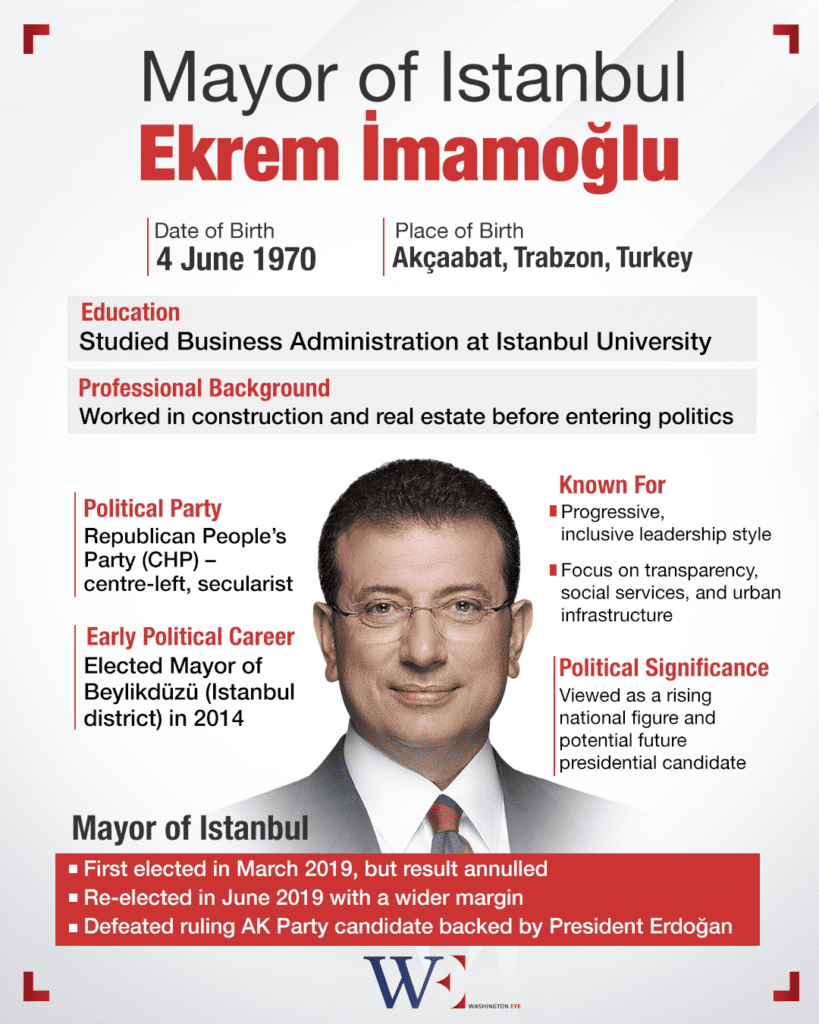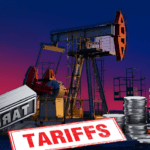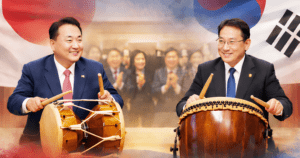The recent detention of Istanbul Mayor Ekrem İmamoğlu, a prominent opposition figure to President Recep Tayyip Erdoğan, has ignited widespread protests across Turkey. The unrest has led to over 1,100 arrests and has drawn international attention to Turkey’s domestic politics and its relationships within NATO, particularly with the United States.
İmamoğlu’s Arrest
On March 19, 2025, Turkish authorities detained İmamoğlu on charges of corruption and alleged ties to the Kurdistan Workers’ Party (PKK), a group designated as a terrorist organization by Turkey. These charges have been met with skepticism by many, who view them as politically motivated attempts to sideline a key rival of President Erdoğan.
The timing of the arrest, coinciding with the annulment of İmamoğlu’s university degree—which could disqualify him from future presidential elections—has further fueled suspicions.
Nationwide Protests and Crackdown
In response to İmamoğlu’s detention, mass demonstrations have erupted in major Turkish cities, including Istanbul, Ankara, and Izmir. Protesters are demanding his release and denouncing what they perceive as an erosion of democratic processes.
The government’s response has been swift and severe, with security forces employing tear gas and rubber bullets to disperse crowds. Reports indicate that more than 1,100 individuals have been detained during these protests, and several journalists covering the events have also been arrested, raising concerns about press freedom in the country.
Economic and Political Implications
The political turmoil has had immediate economic repercussions. The Turkish lira has depreciated significantly against the US dollar, and the Istanbul stock exchange has experienced notable declines. These developments underscore the fragility of Turkey’s economy amid political instability.
Turkey’s NATO Membership and Relations with the U.S.
Turkey’s role as a NATO member adds complexity to its internal political dynamics. The alliance is founded on shared democratic values, and actions perceived as undermining democracy can strain relationships within NATO. The United States, in particular, has a vested interest in Turkey’s political stability, given their strategic partnership within the alliance.
U.S. Arms Sales to Turkey: Strategic Partnership or Ethical Compromise?
Despite deepening authoritarian trends in Turkey and frequent political tensions between Ankara and Washington, military cooperation between the two NATO allies has continued—most notably in the form of high-value arms sales. One of the most prominent examples is the controversial sale of F-16 fighter jets and modernization kits.
In February 2024, the U.S. State Department formally approved a $23 billion deal to sell 40 new F-16 Block 70 fighter jets and upgrade 79 older jets in Turkey’s existing fleet. The agreement, long stalled over Turkey’s foreign policy moves—including its purchase of Russian S-400 missile systems and veto threats on NATO expansion—was greenlit only after Turkey approved Sweden’s NATO accession, signaling that the arms deal may have served as a diplomatic quid pro quo.
However, this transaction has not been without controversy. Many members of the U.S. Congress expressed concern that continued military support could embolden Turkey’s increasingly autocratic leadership.
Senator Bob Menendez, a key critic of the sale, warned that the U.S. must not “reward bad behavior” with advanced weaponry, especially as Turkey cracks down on political dissent and curtails press freedom.
In a surprising reversal, Turkey later announced in November 2024 that it would scale down the original deal. Turkish Defense Minister Yasar Güler said Ankara would proceed only with the purchase of 40 new jets and cancel the modernization kits for its older F-16s, citing revised defense priorities and the need to redirect funds amid economic pressures.
Nonetheless, the core of the deal remains in place, signaling Washington’s willingness to maintain strategic ties with Ankara, despite domestic developments that appear increasingly at odds with Western democratic values. Critics argue that by continuing arms deals, the U.S. risks sending mixed signals—prioritizing military cooperation over human rights and democratic accountability.
As Turkey continues its crackdown on political opposition—as seen in the arrest of Ekrem İmamoğlu—these weapons sales take on even greater symbolic weight. They represent not only a test of strategic partnership but also a test of how firmly the U.S. is willing to stand by the principles that undergird alliances like NATO.
International Response and Future Outlook
The international community has expressed concern over İmamoğlu’s arrest and the subsequent crackdown on protesters. European leaders have criticized the move as undemocratic, and human rights organizations have called for the immediate release of those detained.
The United States faces a delicate balancing act in addressing these developments. While strategic interests may compel continued military cooperation, including arms sales, the U.S. must also consider the implications of supporting a government perceived to be undermining democratic institutions.
A Final Note: The Geopolitics of Silence
The arrest of Ekrem İmamoğlu and the sweeping crackdown on dissent have cast a stark light on Turkey’s internal political trajectory. What might have once been seen as isolated incidents now appear to be part of a broader pattern of democratic backsliding under President Erdoğan. Yet, these events are not just Turkey’s domestic affair—they reverberate through its alliances, especially within NATO.
As a key member of the alliance and a major regional power, Turkey’s actions challenge NATO’s foundational principles of democracy, human rights, and rule of law. At the same time, Turkey’s geostrategic importance—from Black Sea security to migration control—complicates international responses.
The United States, in particular, finds itself walking a diplomatic tightrope. While continuing arms sales and strategic cooperation may serve short-term security interests, they raise difficult questions about long-term commitments to democratic norms. As Turkey deepens its domestic crackdown, these arms deals pose a critical question: can strategic alliances endure without undermining the very democratic values they claim to protect?
















